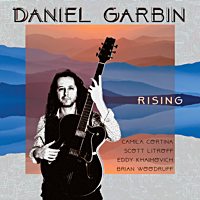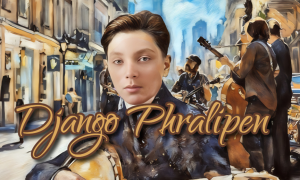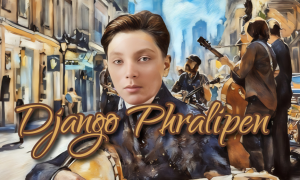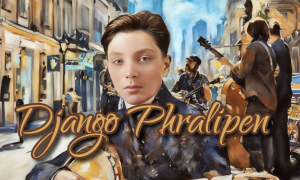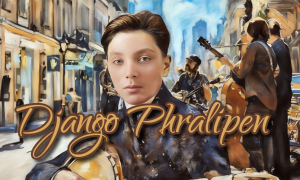Home » Jazz Articles » Django's Cosmic Echo » Chapter Eleven: The Brotherhood Expands
Chapter Eleven: The Brotherhood Expands
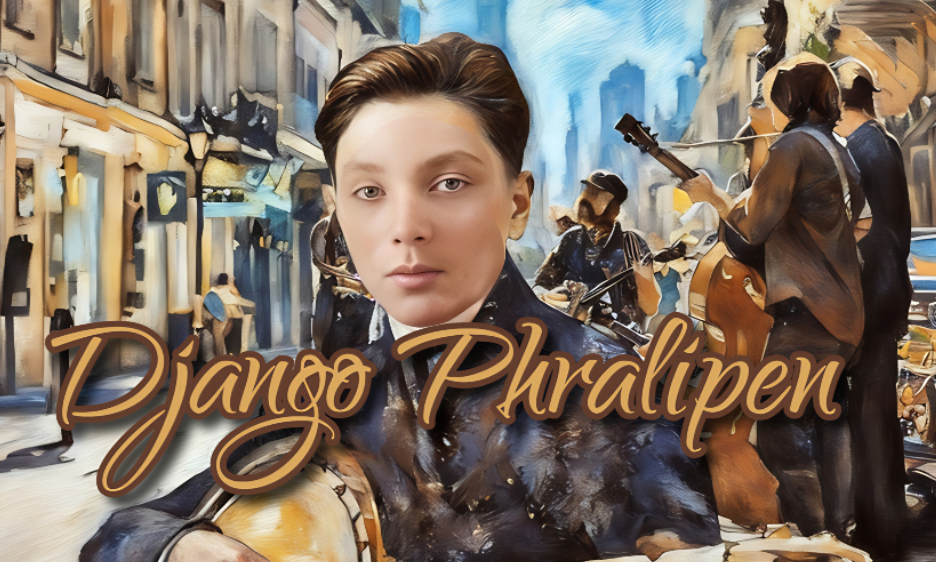
Courtesy AI
Chapters
1 | 2 | 3 | 4 | 5 | 6 | 7 | 8 | 9 | 10 | 11 | 12 | 13 | 14 | 15 | 16 | 17 | 18Dirk Bakker, ever thoughtful, decided to pick Bobbi Holloway up from Schiphol Airport alone. A transatlantic flight was exhausting, and he figured the young woman would appreciate a quiet welcome rather than an immediate immersion into the full, boisterous band. He found her easily—a vibrant spark of American energy amidst the more reserved European travelers. He'd arranged a room for her at a charming, family-run bed & breakfast near the Vondelpark, a tranquil haven where she could acclimatize.
The next morning, Dirk and Django arrived at the B&B on classic Dutch bicycles. After a brief, warm chat with the kindly owner, who readily agreed to let Bobbi use one of her spare bikes during her stay, the trio set off. They pedaled leisurely through the green expanse of the Vondelpark, the city awakening around them, before settling at an outdoor café on the bustling Leidseplein. Over coffee and croissants, they talked—not just about music, but about life, about Dallas and Amsterdam, about dreams and expectations. Django, his English still a work in progress but his sincerity unmistakable, listened intently to Bobbi's experiences, while she, in turn, was captivated by his quiet intensity and the evident warmth between him and Dirk.
Later that afternoon, after Bobbi had a chance to freshen up and retrieve her gleaming flute, they headed to the band's warehouse rehearsal space. The full, now seven-piece ensemble was there: Dave on guitar, Leo on bass, Lars on drums, Stefan on mandolin, and the newer additions, Rico on congas and Anya on percussion, all eager to meet the much-anticipated American arrival. To break the ice, Django simply counted in a medium tempo. "One, two, a-one-two-three-four... " And the band launched into Nat Adderley's classic, "Work Song."
It wasn't a performance; it was an invitation, an exploration. Bobbi, without a word, brought her flute to her lips. From the first phrase, a soulful, bluesy melody that wove effortlessly through the rhythm section's solid groove, it was clear. She wasn't just playing notes; she was speaking the language. The jam stretched, evolved, ebbed, and flowed for over half an hour, Django and Bobbi trading licks, Stefan's mandolin dancing with her flute, Rico and Anya adding layers of intricate rhythm, the whole band locking into a shared pulse. When the final chord faded, a beat of silence hung in the air, then broke into wide smiles and exchanged, knowing looks. She was in. And "Work Song," in that electrifying arrangement, immediately became a fixture in their repertoire.
In the days that followed, Bobbi became an integral part of their musical world, and theirs of hers. She brought with her a stack of her favorite soul jazz records—Les McCann, Eddie Harris, Dr. Lonnie Smith, early Crusaders. Django, whose musical universe had been largely defined by pre-war jazz and the psychedelic rock of the '60s, was utterly captivated. Dirk, too, found himself knocked out by these vibrant, earthy sounds. "These colors," Django marveled one evening, listening to a particularly funky groove, "they paint... moods. Feelings." Their style began to subtly shift, to absorb these new influences. They developed an approach where the music could simply flow, one piece organically morphing into the next, less reliant on traditional song structures that demanded applause breaks. It became about creating a journey: music to make you get up and move, then music to make you sit back, close your eyes, and travel. This aspect of the modern world, this freedom to blend primal impulse with deep emotion, all underpinned by breathtaking musicianship, was heaven for Django.
"We must have a Hammond B3 sound," Django announced decisively a few days later, his eyes alight with new possibilities. "It will give us so many more colors, more options." He looked at Bobbi. "I want to cover a song... 'Just My Imagination.'" Bobbi's smile lit up the room. "Oh, I love that song!" With Bobbi's funky flute and soulful vocals now in the mix, Dave, on his electric guitar, found himself in his element, finally getting the chance to occasionally unleash the wah-wah-inflected rhythm guitar chops he'd been honing. Everything was clicking. Dirk, efficient as ever, held a series of discreet auditions, and soon Marc Reuter, a gifted young organist with a deep understanding of jazz and soul, was brought on board, his Hammond B3 adding a rich, swirling texture to their expanding sound.
To let the newly enlarged, nine-piece band truly gel, Dirk organized a series of low-key gigs in smaller towns around the Netherlands—Groeningen, Utrecht, Leiden. Announced only locally, just a couple of days in advance, these performances were for the band to stretch out, to experiment, to solidify their chemistry away from the Amsterdam buzz. The small, lucky crowds that stumbled into those unassuming venues witnessed history in the making, as the band played with the fire and passion of a Royal Albert Hall headliner.
The machine was now in high gear. Dirk found himself juggling an increasingly complex set of tasks: liaising with Toots Thielemans' management to coordinate his arrival for rehearsals and the studio sessions, confirming a three-night booking at the Paradiso (giving them multiple takes to choose from for the live side of the album), and then locking in the precious studio time at Abbey Road. The whirlwind was picking up speed, but at its calm center was the music, growing richer and more compelling with every passing day.
Story by Alan Bryson, edited and assisted by AI.
Disclaimer: This is a fictional account exploring what might have happened if a temporal quantum event had occurred. While real musicians and historical figures appear within these pages, they exist here in an alternate timeline—a reality that quantum theory suggests was possible, but that never came to pass. All interactions, conversations, and events involving these individuals are entirely fictional, products of a world that exists only in the space between what was and what might have been.
Tags
PREVIOUS / NEXT
Support All About Jazz
 All About Jazz has been a pillar of jazz since 1995, championing it as an art form and, more importantly, supporting the musicians who make it. Our enduring commitment has made "AAJ" one of the most culturally important websites of its kind, read by hundreds of thousands of fans, musicians and industry figures every month.
All About Jazz has been a pillar of jazz since 1995, championing it as an art form and, more importantly, supporting the musicians who make it. Our enduring commitment has made "AAJ" one of the most culturally important websites of its kind, read by hundreds of thousands of fans, musicians and industry figures every month.



